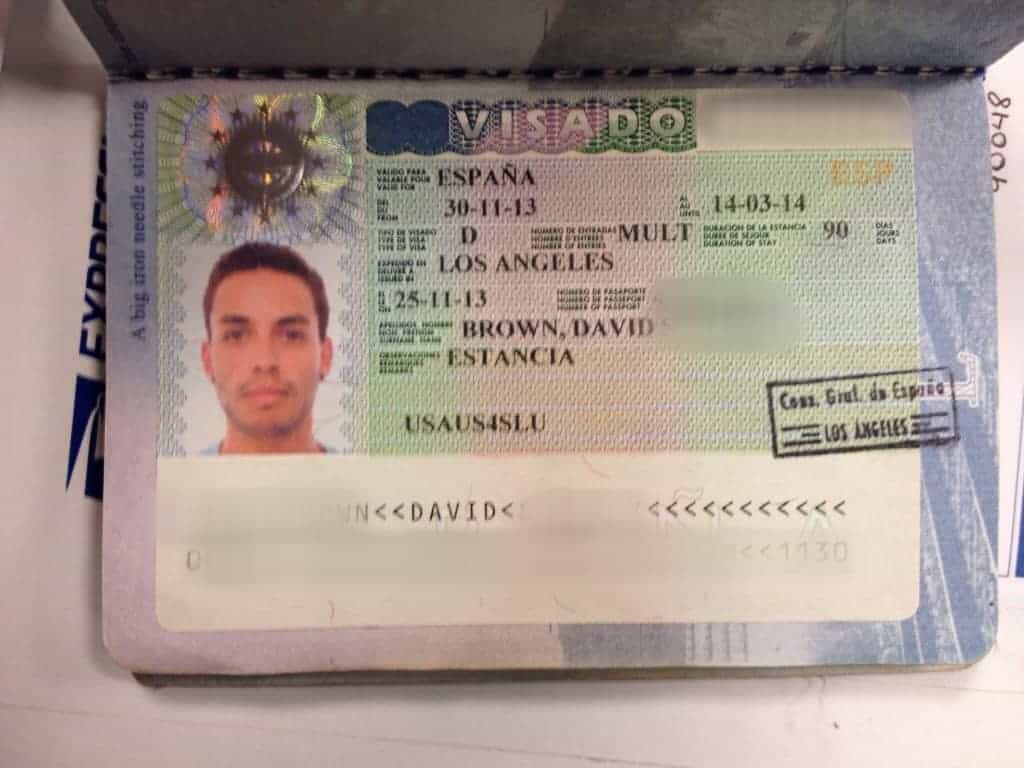After more than a year of living abroad and juggling Schengen visas and French long stay visas, the time has finally come for me to apply for a Spanish visa. While David applied for his visa for Spain last October, I didn’t think the path to Spanish residency was as easy for me. But I recently found out that Spain offers a “non lucrative residency visa,” or basically a visa which allows Americans moving to Spain to live there without working.
Much like the long stay French visa I received last year, this Spain residence visa allows me to stay in longer than the standard 90 days allotted to American citizens. And like the French visa, you must agree to not work in Spain and that you have sufficient income from outside sources to support you during your stay.
The visa application process is explained on the consulate’s website but for some reason we never found this Spain visa information before. Now after a moving to Spain and a year and a half later, I finally figured out to how get a long term visa (aka: long stay visa Spain) and how to move to Spain legally. Though the visa requirements for Spain are mostly clear, it’s one of the more complicated residency visa applications in Europe that I’ve seen.
Download our Top 10 most Frequently Asked Questions for FREE!
The most difficult part for me was the fact that I must apply and pick up my issued visa in person, at the consulate within my jurisdiction. Since I’m still technically a US resident, I have to apply in Los Angeles since my home address is in Phoenix. There are 8 Spanish consulates in the US and each covers a different jurisdiction. You can check to see which consulate covers your area at the end of this post. The other challenge is the visa application process can take up to 3 months for approval, though the Los Angeles consulate informed me that most applications are processed within 30 days.
Below are the steps required for the application with some notes and clarifications that I discovered along the way. Note that these requirements are mostly based on the instructions from the Los Angeles Consulate, which should be the same for all US citizens, though I’ve seen differences and discrepancies on each of the 8 Spanish Consulate websites.
Application Requirements for the Spanish Residency Visa
1. In Person Appointment – Request your visa appointment online at your consulate. Do this at least 3 months in advance or more! You can always change or reschedule your appointment later. Update 10/1: The interview process was extremely difficult and the LA consulate is strict. Be sure you follow ALL instructions and ask questions by email well in advance if you have any doubts.
2. Application From – Fill out the Spain visa application form. This is simple and straight forward since you can download the form online.
3. Passport Photos – You must submit two passport photos with your application – another simple step.
4. Passport – You need to provide your passport during the application process and the catch is that it must be valid for 4 months after you plan to leave Spain. In other words, if you plan to stay a year in Spain and the application process can take up to 3 months for processing, your passport must not expire before 1 year and 7 months from the day you submit your application. Update 10/1: You should also bring your drivers license/ID as well as a copy.
5. Residence Form – You need to submit the form EX-01 called “Solicitud de autorización de estancia y prórrogas” which is essentially the application for the Spain residence permit. The Spanish visa application form in Step 2 listed above is specifically for the Spanish residence visa and not necessarily for the Spain residence permit itself. Update 10/1: The LA consulate webpage is wrong (it requests EX-00) and they do actually require form EX-01 plus the $14 fee required to process your residency using form M790 C052.
6. US Residency – If you’re a US resident but not a citizen, there is an extra step to prove your valid immigration into the US, but this did not apply to me.
7. Medical Certificate – You must obtain a medical certificate from a doctor stating you are in good health and don’t suffer any illnesses that would threaten public health. The certificate needs to be signed and on a doctors letterhead. The website specifically says the certificate should be issued in the place of residence. For me this was annoying because I was already in Spain and not at my official residence in Arizona. So my plan is to fly to Phoenix to get my medical certificate the week before I apply for my visa in Los Angeles. I found a doctor in Phoenix specializing in immigration services that charges $140 for the physical and certificate.
8. Criminal Record History – You need to submit a Criminal Record History from either your state or the FBI. This step is the most difficult and biggest headache. Some states, including Arizona, don’t actually issue background checks so I was required to request my criminal cecord history from the FBI. The FBI requires fingerprints to be taken on a special form and then mailed along with the application. The FBI can take 30-60 days to complete this process. Once you receive the background check from either your state or the FBI, you need to get the document legalized by obtaining the stamp of the “Apostille of The Hague.” This process takes another 1-2 weeks. And if this isn’t already complicated enough, the final document then has to be translated into Spanish. So trying to get all this documentation completed before your visa appointment is difficult because the process itself can take 2-3 months. Make sure you check with both your state and your consulate to determine if you can get your background check at the state or FBI level. State reports may also need to be notarized.
9. Health Insurance – You need to obtain travel/health insurance for the entire duration of your stay in Spain. The important part is to ensure the policy covers emergency medical expenses and repatriation services with minimum coverage of 30.000€. In my case I purchased insurance from World Nomads because their policy meets the Spanish visa requirements and I have been using them for 2 years already with nothing but positive experiences. Update 10/1: The LA consulate accepted my insurance from World Nomads. This was great because it covers me in Spain and also when traveling in Europe and abroad. Be sure to check the requirements at your consulate since they can change from time to time.
Note: You can buy this exact travel insurance directly through our site by clicking this link.
10. Proof of Sufficient Funds – Since you aren’t allowed to work while in Spain, you have to prove that you have sufficient income or savings to support yourself during your stay. In my case, I am working but because I work for American companies outside Spain, this is acceptable and I just need to prove I earn enough to support myself. The visa instructions on the Los Angeles consulate don’t specifically list an amount you need to show but several other consulate pages mentions 2,130€ per month (plus 532€ extra for a spouse and/or each dependent). In my case, I will provide bank statements for 3 months showing my balance in checking and savings accounts as well as 3 months worth of freelance invoices and payments received. Update 10/1: The proof of sufficient funds is extremely subjective. You should show your monthly income and any savings you have as well.
11. Proof of Accommodation – You need to also submit proof of where you will live while in Spain, whether it’s property ownership or if you’re renting or leasing. In my case, David and I are renting an apartment and we already have a lease with my name listed on the contract. This was simple for me since I’ve already been in Spain on and off for the past year. An alternative might be to get an extended apartment through AirBnB or another company that provides housing. If you plan on living with friends or family while in Spain, they can provide a letter inviting you to stay. We actually took that approach when we applied for our French visa application. Again, the Los Angeles consulate page doesn’t provide detailed instructions on this step but I found that the Miami consulate has good details and states that you can provide a lease, property deed or “Letter explaining the reason why you have chosen that city in particular.”
12. Visa Fee – You also have to pay the $140 visa application fee with a money order.
13. Spouse or Family – If you are married and plan on bringing your spouse, he or she needs to submit the same documents plus your marriage certificate, legalized by the Apostille of The Hague and translated into Spanish. Although David and I are in the process of getting legally married in Spain, this process didn’t apply to me because I am applying for this visa on my own. The same applies to any children you’re bringing, except the extra document would be the birth certificate(s).
Need help with your application for your Non Lucrative Visa for Spain? WE CAN HELP! Learn more here…
So to be fair, the Spain residency process is difficult, time consuming and frustrating at times. But if you’re like me and really want to move to Spain and continue working on your own terms, then this is the visa for you. Alternatively, you can apply to one of the many English teaching programs which make the visa application process much easier. The downside is that the visa is only temporary for your job contract, you don’t have a lot of choices when it comes to your cities and school placements and obviously, you have to teach English during your stay. So if you happen to work from home whether it’s IT, graphic design or another field, then this is one of your only options in Spain. Similar visas exist in France and Germany and the process in those countries are easier and more straightforward.
Additional Notes
1. You will need to submit two copies of each document – the original and one photocopy.
2. The criminal background check and medical certificate are only valid from 3 months of issue. So for example, if your background check was dated on May 1st, you must apply for your visa before August 1st.
3. Some documents need to be translated into Spanish. In my case, the Los Angeles consulate only specifically requested the medical certificate and criminal background check to be translated but it’s best to directly ask your consulate about their requirements. Update 10/1: The LA consulate now requires “ALL” documents to be translated. Check with your individual consulate for clarification.
4. You probably need to start planning out this process at least 5-6 months in advance for your Spanish residency visa. The complications of timing with requesting your appointment, getting your background check or applying for a new passport need a bit of extra planning because they can take a 2-3 months to process in some cases.
5. I also got confirmation from the Los Angeles consulate that I must apply for and pick up the granted visa in person. Other visa types or other consulates may allow you to mail in your application and some allow you to have an authorized person do activities on your behalf.
6. Processing times vary for each consulate. I’ve seen processing times that range from one to six months.
7. Links to the various Spanish consulates in the US can be found here. You’ll need to find out which jurisdiction you live in and apply at the consulate within that region.
- Boston (doesn’t mention non-lucrative visa directly)
- Chicago (called non lucrative residence visa)
- Houston (called non-lucrative visa)
- Los Angeles (called Residence Visa)
- Miami (called Non-Profit Visa)
- New York (called Residence visa with Non-Lucrative purposes)
- San Francisco (called Residence for Non-Lucrative Visa)
- Washington DC (called Non Lucrative Visa Spain)
Here are some additional blogger resources for applying for visas in Spain, including the Spanish Residency Visa. These people have successfully received both residence and student visas at various consulates and give good tips on what you need to do it.
- How to Get Residence in Spain as a US Citizen via Kurpe Diem
- Applying for a Spanish Student Visa through Boston via Life After College
- How to Get Your Spanish Student Visa via Rookie Notes
- Visas to Spain via Vado a Spain
- How to apply for a VISA to Spain via Louisiana Nomad
- How to Apply for a Student Visa for Spain at the Houston Consulate via A Texan in Spain
- The Application Process for a Spanish Visa via Wonderburger
Download our Top 10 most Frequently Asked Questions for FREE!
Update: I’m currently in the process of applying for this visa. Making an appointment with the Los Angeles Consulate has been particularly difficult as appointments were not available until 3 months out. My appointment is currently scheduled for September 9th and all my documents are either collected or in process. I’ll make any modifications to this Spain visa information based on the results of my Spanish residency application.
Updated Oct 1st, 2014: My visa application was accepted on September 9th, however the LA consulate didn't particularly like the financial records that I provided. As a freelancer they wanted to see more “official” documents. They offered to process my visa application as a student spouse since David is currently studying for a masters in Spain. Rather than risking not getting any visa at all, I accepted this approach for convenience. My goal next year is to apply for the non-lucrative visa again so I have an entire year to get my financial records in order. The rest of the application process was fairly straight-forward though I've made a few updates to the post above.
Note: If you buy travel insurance directly through our site, this won’t cost you any extra but we do receive a very small commission when you go through our link. Thanks and we appreciate your support!







Comment (0)